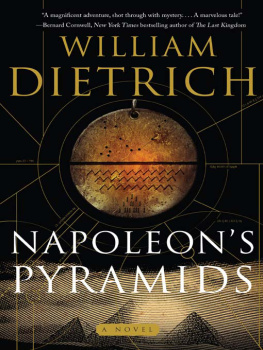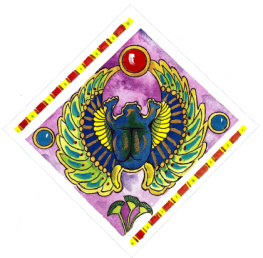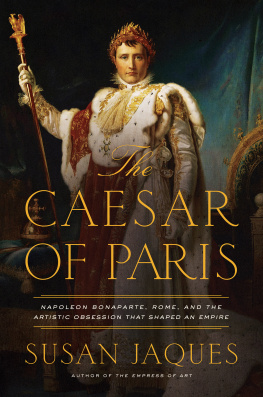NAPOLEONS PYRAMIDS
A Novel
W ILLIAM D IETRICH

To my daughter, Lisa
CONTENTS
It was luck at cards that started the trouble, and
It was a pathetic attempt at verbal revenge. I bowed
The chemist Claude-Louis Berthollet was, at age forty-nine, the most
The thieves, or agentsthey were too often the same
One month later, on May 19, 1798, I stood on
I almost drowned in the surf of Alexandria because of
Victory is sometimes more untidy than battle. An assault can
Then the well runs dry we know the worth of
It was 2 P.M., the hottest time of the day,
The home of Ashraf s oddly named brother was in
I began with one of the expeditions astronomers, Nicholas-Antoine Nouet.
Napoleon was in a good mood when I asked for
I left the calendar and joined a tide of men
My first task, upon hearing this disturbing news, was to
They killed him as a message to me, I said.
Napoleons visit to the pyramids was a grander excursion than
I reluctantly stayed as ordered to help Jomard and Monge
There was no wider gulf between the invading French army
The Egyptian desert west of the Nile is a trackless
I knew that the notion of galloping into Desaixs division
The Nile was high, brown, and powerful. It was October,
Our ride back north toward Cairo was a journey through
Once more the shaft seemed designed for the gliding of
Moses was an Egyptian prince who knew how this chamber
I t was luck at cards that started the trouble, and enlistment in mad invasion that seemed the way out of it. I won a trinket and almost lost my life, so take lesson. Gambling is a vice.
Its also seductive, social, and as natural, I would argue, as breathing. Isnt birth itself a roll of the dice, fortune casting one babe as peasant and another as king? In the wake of the French Revolution the stakes have simply been raised, with ambitious lawyers ruling as temporary dictators and poor King Louis losing his head. During the Reign of Terror the specter of the guillotine made existence itself a matter of chance. Then, with the death of Robespierre came an insanity of relief, giddy couples dancing on the tombs of St.-Sulpice Cemetery to a new German step called the waltz . Now, four years later, the nation has settled into war, corruption, and the pursuit of pleasure. Drabness has given way to brilliant uniform, modesty to dcolletage, and looted mansions are being reoccupied as intellectual salons and chambers of seduction. If nobility is still an offense, revolutionary wealth is creating a new aristocracy. Theres a clique of self-proclaimed wonderful women who parade Paris to boast of their insolent luxury amid public wretchedness. There are balls that mock the guillotine, where ladies wear red ribbons at their throat. The city counts four thousand gambling houses, some so plain that patrons carry in their own folding stools, and others so opulent that hors doeuvre are served on sacramental plate and the privy is indoors. My American correspondents find both practices equally scandalous. The dice and cards fly: creps, trente-et-un, pharaon, biribi. Meanwhile armies tramp on Frances borders, inflation is ruinous, and weeds grow in the deserted courtyards of Versailles. So to risk a purse in pursuit of a nine in chemin de fer seemed as natural and foolish as life itself. How was I to know that betting would bring me to Bonaparte?
Had I been inclined to superstition, I might have made note that the date, April 13, 1798, was a Friday. But it was springtime in revolutionary Paris, meaning that under the Directorys new calendar it was the twenty-fourth day of the month of Germinal in the Year Six, and the next day of rest was still six days distant, not two.
Has any reform been more futile? The governments arrogant discard of Christianity means that weeks have been extended to ten days instead of seven. The revisions intent is to supplant the papal calendar with a uniform alternative of twelve months of thirty days each, based on the system of ancient Egypt. Bibles themselves were torn up to make paper gun cartridges in the grim days of 1793, and now the biblical week has been guillotined, each month instead divided into three decades of ten days, with the year beginning at the autumn equinox and five to six holidays added to balance idealism with our solar orbit. Not content with regimenting the calendar, the government has introduced a new metric system for weight and measure. There are even proposals for a new clock of precisely 100,000 seconds each day. Reason, reason! And the result is that all of us, even Iamateur scientist, investigator of electricity, entrepreneur, sharpshooter, and democratic idealistmiss Sundays. The new calendar is the kind of logical idea imposed by clever people that completely ignores habit, emotion, and human nature and thus forecasts the Revolutions doom. Do I sound prescient? To be honest, I wasnt used to thinking about popular opinion in such a calculating manner yet. Napoleon would teach me that.
No, my thought was focused on counting the turn of cards. Had I been a man of nature I might have left the salons to enjoy the years first blush of red bud and green leaf, perhaps contemplating the damsels of the Tuileries Garden, or at least the whores of the Bois de Boulogne. But Id chosen the card cozies of Paris, that glorious and grimy city of perfume and pollution, monument and mud. My spring was candlelight, my flowers courtesans of such precariously suspended cleavage that their twin advertisements teetered on the brink of escape, and my companions a new democracy of politician and soldier, displaced nobleman and newly rich shopkeeper: citizens all. I, Ethan Gage, was the salons American representative of frontier democracy. I had minor status thanks to my earlier apprenticeship to the late, great Benjamin Franklin. Hed taught me enough about electricity to let me amuse gatherings by cranking a cylinder to impart a frictional charge to the hands of the prettier ones and then daring the men to try a literally shocking kiss. I had minor fame from shooting exhibitions that demonstrated the accuracy of the American longrifle: I had put six balls through a pewter plate at two hundred paces, and with luck had cut the plume from a skeptical generals hat at fifty. I had minor income from trying to forge contracts between war-pressed France and my own infant and neutral nation, a task made damnably difficult by the revolutionary habit of seizing American ships. What I didnt have was much purpose beyond the amusement of daily existence: I was one of those amiably drifting single men who wait for the future to start. Nor did I have income enough to comfortably support myself in inflationary Paris. So I tried to augment it with luck.
Our host was the deliberately mysterious Madame dLibert, one of those enterprising women of beauty and ambition who had emerged from revolutionary anarchy to dazzle with wit and will. Who had known females could be so ambitious, so clever, so alluring? She gave orders like a sergeant major, and yet had seized on the new fad for classical gowns to advertise her feminine charms with fabric so diaphanous that the discerning could detect the dark triangle pointing to her temple of Venus. Nipples peeped over the top of her drapery like soldiers from a trench, the pair of them rouged just in case we might overlook their boldness. Another mademoiselle had her breasts exposed entirely, like hanging fruit. Was it any wonder that Id taken the risk of returning to Paris? Who cannot love a capital that has three times as many winemakers as bakers? Not to be outdone by the women, some of the male peacocks sported cravats reaching as high as their lower lip, cod-tailed coats that descended to the back of their knees, slippers as dainty as kittens paws, and golden rings that glittered on their ears.



















